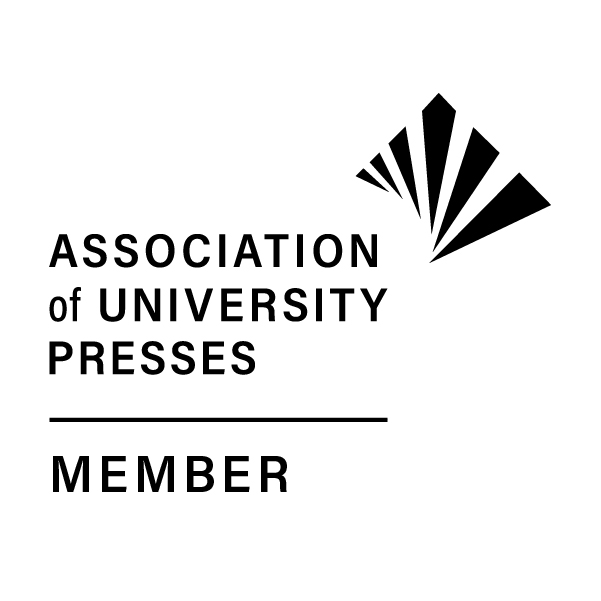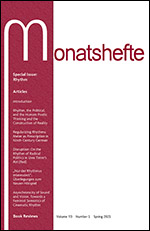|


|

Subscribe
Read the Journal Online
Submission Guidelines
Editorial Board
Receive Email Updates
Advertise in Monatshefte
Indexes/Abstracts
Current Issue TOC
Back Issues TOC
Monatshefte 2022 Subscription Rates
Institutions:
print & online $271
online only $233
Individuals:
print & online $103
online only $86
Non U.S. Postage (no postage charges for online-only subscriptions)
Airmail: add $40/yr.
Canadian Subscribers: add 5% GST. |
Monatshefte
Volume 98, Number 4, Winter 2006 Table of Contents
À Propos
“Letzte Strahlen der untergehenden deutschen Bildungssonne.” Robert(o) Schopflochers argentinische Reflexionen und Reminiszenzen. Interview mit Friedrick A. Lubich
Robert Schopflocher was born in Fürth, Bavaria in 1923 and emigrated with his family to Argentina in 1937 where he made a name for himself as the author of several scholarly books, novels, plays, and short stories written in Spanish, as well as a painter and woodcutter whose works were honored with numerous awards and exhibitions. In the early 1980s, Schopflocher began to write in German again, which has been bringing him growing attention in the media of German-speaking countries. Today he can be considered one of the last and certainly most prominent of German-Jewish authors in Argentina and most likely in Latin America. (FAL; in German)
Articles
Darren Hopkins
The Original Tale of the Sparrow-Hawk
Abstract:
As part of a sub-story-type of the ancient Greek legend of the maiden Kydippe and her lover Akontios there occur in MHG and OF four analogous tales: Garin’s fabliau, De la grue (late 12th C), the fragmentary mære, Dulciflorie (ca. 1200); the mære, Der sperwære (ca. 1225–1245); and the fabliau, Du heron (mid-13th C). The author of the earliest of these tales, Garin, declares that he first heard a version of this story in the markets of the medieval French town of Vercelai (Vézelay). The original story as he heard it appears to have been dramatically changed, and turned into a fabliau. Dulciflorie, a translation of an earlier Old French story, represents an older courtly version of the tale. Taking this fragmentary text as the closest representative of the archetype of the ‘Tale of the Sparrow-Hawk,’ I have tried to reconstruct a picture of the original as Garin may have heard it, using the other three analogues to reconstruct those portions of the story that have been lost. (DH)
Anthony Krupp
Cultivation as Maturation: Infants, Children, and Adults in Alexander Gottlieb Baumgarten’s Aesthetica
Abstract:
It is widely known that Alexander Baumgarten’s 1750/1758 Aesthetica bestowed new philosophical dignity upon what his rationalist teachers had called the ‘inferior’ faculties. It is not yet well known that this examination of the ‘whole person’ identified natural improvisation and play in infancy and childhood as the source of aesthetic production and reception. But Baumgarten’s primitivism is fleeting; he quickly turns to the adult, whose more disciplined cultural productions henceforth receive his exclusive attention. Still, his adult-centered text contains a proto-Romantic moment, in which children teach adults the proper response to works of beauty. This article explores Baumgarten’s ambivalent assessment of childhood, and suggests that his specific attempt to link infancy and adulthood in a unified narrative is fraught with the same tension that inhabits his general attempt to link sensation and reason. (AK)
Patrick Bühler
Die “Todesdidaktik” in Hermann Burgers Schilten
Abstract:
Hermann Burger’s (1942–1989) first novel Schilten (1976) is a “Schulbericht zuhanden der Inspektorenkonferenz”: The teacher Armin Schildknecht gives an account of his special didactics, his “Todesdidaktik.” Research on Schilten has tended to interpret the teacher’s obsession with death—a recurring motive in Burger’s work—as a symptom of Burger’s depression or an indication of Schildknecht’s madness. The article argues that “though this be madness, yet there is method in’t”: Exploring the educational Wahnsystem shows that Schildknecht explores not death, but teaches what cannot be taught. Thus, the analysis of Schilten and other works by Burger, such as his thesis on Paul Celan (1974), explain Schildknecht’s paradoxical didactics as dealing with a special kind of death: The ‘death’ induced by language, our constant search for a “verlorene Sprache” as indicated in the title of Burger’s dissertation on Celan. (PB; in German)
Personalia
Introduction, German Departments in the U.S.A., German Departments in Canada, Promotions, New Appointments, Visitors, Retirements, Necrology, Doctoral Dissertations, Summary
Book Reviews
Adam, Wolfgang und Markus Fauser, Hrsg., Geselligkeit und Bibliothek. Lesekultur im 18. Jahrhundert (Johannes Birgfeld)
Becker, Jurek, Jakob der Lügner. Text und Kommentar (Sabine Groß)
Bernhart, Walter and Werner Wolf, eds., Essays on Literature and Music (1967–2004) by Steven Paul Scher (Vera Stegmann)
Bosco, Lorella, “Das furchtbar-schöne Gorgonenhaupt des Klassischen.” Deutsche Antikebilder (1775–1875) (Jeff Morrison)
Dueck, Cheryl, Rifts in Time and in the Self: The Female Subject in Two Generations of East German Women Writers (Elizabeth Mittman)
Emden, Christian J., Nietzsche on Language, Consciousness, and the Body (Ivan Soll)
Fontane, Theodor, Effi Briest. Text und Kommentar (Sabine Groß)
Handke, Peter, Wunschloses Unglück. Text und Kommentar (Sabine Groß)
Hasty, Will, ed., A Companion to Gottfried von Straßburg’s Tristan (Salvatore Calomino)
Hebbel, Friedrich, Maria Magdalena. Text und Kommentar (Sabine Groß)
Heinzle, Joachim, Die Nibelungen. Lied und Sage (Albrecht Classen)
Kraft, Herbert, Musil (Christian Rogowski)
Lubrich, Oliver, Hrsg., Reisen ins Reich 1933 bis 1945. Ausländische Autoren berichten aus Deutschland (Theodore F. Rippey)
Nenon, Monika, Aus der Fülle der Herzen. Geselligkeit, Briefkultur und Literatur um Sophie von La Roche und Friedrich Heinrich Jacobi (Wulf Koepke)
Niekerk, Carl, Zwischen Naturgeschichte und Anthropologie. Lichtenberg im Kontext der Spätaufklärung (Gunhild Berg)
Poor, Sarah S., Mechthild of Magdeburg and Her Book: Gender and the Making of Textual Authority (Kathleen J. Meyer)
Schiller, Friedrich, Die Räuber. Text und Kommentar (Sabine Groß)
Schnieder, Jost, Sozialgeschichte des Lesens. Zur historischen Entwicklung und sozialen Differenzierung der literarischen Kommunikation in Deutschland (Holger Böning)
Schüller, Liane, Vom Ernst der Zerstreuung. Schreibende Frauen am Ende der Weimarer Republik: Marieluise Fleißer, Irmgard Keun und Gabriele Tergit (Hiltrud Häntzschel)
Speirs, Ronald and John Breuilly, eds., Germany’s Two Unifications: Anticipations, Experiences, Responses (Marcel Rotter)
Index Volume 98 (2006)
|


